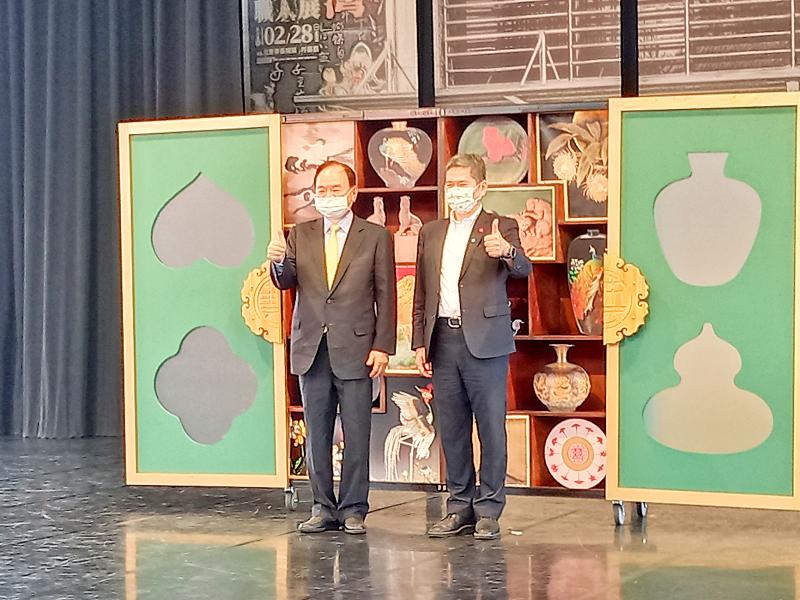PX Mart Co Ltd (全聯實業) chairman Lin Ming-hsiung (林敏雄) on Wednesday said that both RT-Mart International Ltd (大潤發) and Carrefour Taiwan (家樂福) had approached him with sales offers.
Lin told local media on the sidelines of a public event that both companies had asked about the supermarket chain operator’s interest in buying them out. He declined to comment further as the topic is sensitive, local media reported.
Lin made the remarks at the inauguration of the Gallery of Taiwan Traditional Art (巧藝館) at the National Center for Traditional Arts’ (國立傳統藝術中心) Yilan campus. The gallery is sponsored by Pxmart’s Sunmake Cultural Foundation (全聯善美的文化藝術基金會).

Photo: Chiang Chih-hsiung, Taipei Times
Carrefour Taiwan in February acquired Wellcome Taiwan Co’s (惠康百貨) chain of supermarkets and the upscale Jasons Market Place stores. The deal left Carrefour with 66 big-box hypermarkets, 262 supermarkets and 25 Jasons Market Place stores.
Lin said the fact that Carrefour and RT-Mart are looking to sell their Taiwan operations highlights the challenges the grocery sector is facing, adding that if only the biggest player can survive in the market, it is not a good market, the local media reported.
PX Mart, which operates as Pxmart, has 1,055 stores in Taiwan. The company plans to expand to 1,068 stores by the end of the year, and forecasts revenue of NT$150 billion this year, Lin said.

To many, Tatu City on the outskirts of Nairobi looks like a success. The first city entirely built by a private company to be operational in east Africa, with about 25,000 people living and working there, it accounts for about two-thirds of all foreign investment in Kenya. Its low-tax status has attracted more than 100 businesses including Heineken, coffee brand Dormans, and the biggest call-center and cold-chain transport firms in the region. However, to some local politicians, Tatu City has looked more like a target for extortion. A parade of governors have demanded land worth millions of dollars in exchange

Hong Kong authorities ramped up sales of the local dollar as the greenback’s slide threatened the foreign-exchange peg. The Hong Kong Monetary Authority (HKMA) sold a record HK$60.5 billion (US$7.8 billion) of the city’s currency, according to an alert sent on its Bloomberg page yesterday in Asia, after it tested the upper end of its trading band. That added to the HK$56.1 billion of sales versus the greenback since Friday. The rapid intervention signals efforts from the city’s authorities to limit the local currency’s moves within its HK$7.75 to HK$7.85 per US dollar trading band. Heavy sales of the local dollar by

Taiwan Semiconductor Manufacturing Co’s (TSMC, 台積電) revenue jumped 48 percent last month, underscoring how electronics firms scrambled to acquire essential components before global tariffs took effect. The main chipmaker for Apple Inc and Nvidia Corp reported monthly sales of NT$349.6 billion (US$11.6 billion). That compares with the average analysts’ estimate for a 38 percent rise in second-quarter revenue. US President Donald Trump’s trade war is prompting economists to retool GDP forecasts worldwide, casting doubt over the outlook for everything from iPhone demand to computing and datacenter construction. However, TSMC — a barometer for global tech spending given its central role in the

An Indonesian animated movie is smashing regional box office records and could be set for wider success as it prepares to open beyond the Southeast Asian archipelago’s silver screens. Jumbo — a film based on the adventures of main character, Don, a large orphaned Indonesian boy facing bullying at school — last month became the highest-grossing Southeast Asian animated film, raking in more than US$8 million. Released at the end of March to coincide with the Eid holidays after the Islamic fasting month of Ramadan, the movie has hit 8 million ticket sales, the third-highest in Indonesian cinema history, Film